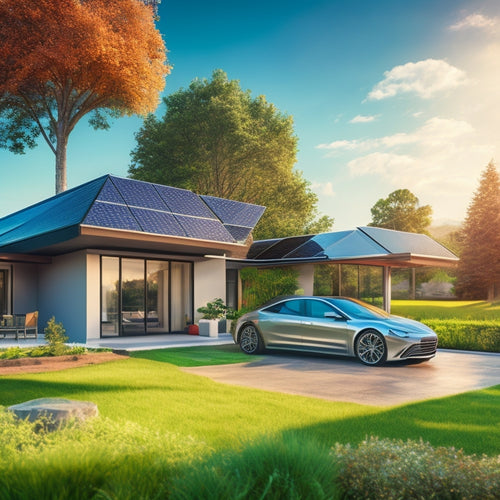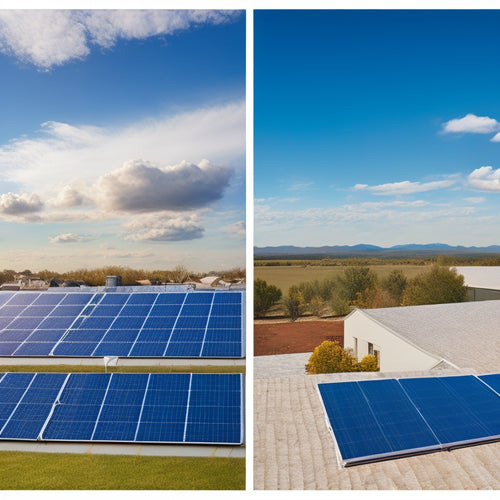
Financing Your Dream: Residential Solar Panel Options
Share
You're considering residential solar panels, but financing options can make or break your dream of harnessing clean energy. Fortunately, you have several options to explore. Online solar loan providers like Sunlight Financial and Dividend offer various loan options with digital applications and streamlined financing processes. You can also access a network of lenders and financial institutions through solar panel financing platforms. Additionally, you may be eligible for low-interest rate options, government incentives, and alternative financing options like solar panel lease agreements and power purchase agreements. As you navigate these possibilities, you'll discover more ways to make your dream a reality.
Key Takeaways
• Online solar loan providers like Sunlight Financial and Dividend offer various loan options with digital applications for easy rate and term comparisons.
• Government incentives like the federal solar investment tax credit and renewable grants can offset initial investment costs and make solar energy more accessible.
• Alternative financing options like solar panel lease agreements and power purchase agreements allow homeowners to bypass upfront costs and enjoy environmental benefits.
• Low-interest rate options are available, including home equity loans, federal subsidies, and manufacturer financing, with rates ranging from 2.5% to 7.5%.
• Special financing options are available for individuals with bad credit, including no credit check financing and high-risk lenders, but beware of exorbitant interest rates and predatory practices.
Online Solar Loan Providers
Online solar loan providers, such as Sunlight Financial and Dividend, offer homeowners a convenient way to finance their residential solar panel systems, providing a range of loan options with varying terms and interest rates.
You can access their digital applications online, allowing you to easily compare rates and terms. These online platforms streamline the financing process, making it faster and more efficient.
With online reviews from previous customers, you can make an informed decision about which provider to choose. You'll have the power to select the loan option that best fits your budget and energy goals.
By leveraging technology, online solar loan providers reduce the complexity and cost associated with traditional financing methods. This shift towards digital applications has increased accessibility and transparency in the residential solar market.
As you explore your financing options, consider the benefits of working with online solar loan providers, who can help you harness the power of the sun while keeping your wallet in mind.
Solar Panel Financing Platforms
In addition to solar panel financing platforms, you can access a network of lenders and financial institutions offering competitive rates and terms, allowing you to compare and select the best option for your residential solar project.
These platforms have revolutionized the solar industry by providing homeowners with a one-stop-shop for financing their solar panel installations. By leveraging technology and data analytics, these platforms can assess your creditworthiness and match you with suitable lenders, ensuring a seamless and efficient financing process.
Additionally, they often provide educational resources and tools to enhance your financial literacy, empowering you to make informed decisions about your solar investment. With solar panel financing platforms, you can enjoy the benefits of solar energy while minimizing upfront costs.
Low-Interest Rate Options Available
When exploring financing options for your residential solar project, you'll find that low-interest rate options are available, offering you a more affordable path to harnessing renewable energy. These options can greatly reduce the upfront costs associated with installing solar panels, making it more feasible to switch to clean energy.
Here's a comparison of low-interest rate options:
| Option | Interest Rate |
|---|---|
| Home Equity Loan | 4.5% - 6.5% |
| Federal Subsidies | 2.5% - 4.5% |
| Solar Loan | 5.5% - 7.5% |
| Credit Union Loan | 5.0% - 7.0% |
| Manufacturer Financing | 4.0% - 6.0% |
Keep in mind that interest rates may vary depending on your credit score, location, and other factors. Researching and comparing rates from different lenders is crucial to find the best option for your solar project. Additionally, consider exploring home equity options, which can provide a lower interest rate compared to traditional solar loans. With the right financing, you can start reaping the benefits of solar energy without breaking the bank.
Government Incentives for Homeowners
You can further reduce the upfront costs of your residential solar project by taking advantage of government incentives designed specifically for homeowners. These incentives can greatly offset the initial investment and make solar energy more accessible.
One of the most attractive incentives is the federal solar investment tax credit (ITC), which allows you to claim a tax credit of 26% of the total cost of your solar panel system. This credit can be claimed on your federal income taxes, providing a substantial reduction in your tax liability.
Additionally, you may be eligible for renewable grants, such as the USDA's Rural Energy for America Program, which provides financial assistance for rural homeowners and small businesses. These grants can help cover a significant portion of the project costs.
Solar Panel Lease Agreements
By entering into a solar panel lease agreement, homeowners can bypass the upfront costs associated with purchasing a system, allowing them to harness the power of solar energy without breaking the bank. This financing option provides a unique opportunity to go green without the hefty initial investment.
With a lease agreement, you'll typically pay a monthly fee to use the solar panels, which are installed and maintained by the leasing company. This arrangement offers several benefits, including fixed monthly payments, warranty coverage, and scheduled maintenance. You'll also enjoy the environmental benefits of solar energy without shouldering the full cost of system ownership.
Lease agreements often come with flexible terms, allowing you to choose the contract duration and monthly payment amount that suits your budget. Additionally, many lease providers offer monitoring and maintenance services, ensuring your system operates at peak efficiency.
Power Purchase Agreements Explained
Through power purchase agreements (PPAs), homeowners can benefit from solar energy without shouldering the upfront costs or maintenance responsibilities associated with system ownership. With a PPA, you'll enter into a long-term contract with a solar provider, typically spanning 10 to 20 years. In exchange for a reduced or zero upfront cost, you'll agree to purchase the electricity generated by the solar panels at a fixed rate, which is often lower than your current utility rate. This arrangement provides you with predictable energy costs and a cleaner energy source.
One advantage of PPAs is contract flexibility. You can choose from various contract terms, including the length of the agreement, the electricity rate, and the option to purchase the system at a later date. Additionally, PPAs often come with Renewable Certificates (RECs), which represent the environmental attributes of the solar energy produced. RECs can be sold or traded, providing an additional revenue stream for the solar provider.
Solar Financing for Low Credit
As you explore solar financing options, you'll find that having a low credit score can limit your choices. However, you still have alternatives, such as bad credit lenders or financing options that don't require a credit check.
You'll want to carefully evaluate these options, weighing their pros and cons, to find the best fit for your residential solar panel project.
Bad Credit Alternatives
You can still go solar even with bad credit, thanks to alternative financing options that cater specifically to individuals with low credit scores. These options understand that credit scores don't define your ability to pay, and offer flexible payment plans and lenient credit requirements.
One approach is to work with credit counseling services that help you improve your credit score through financial planning and debt management. By doing so, you'll become a more attractive borrower, and lenders will be more willing to approve your solar financing application.
Another option is to explore financing companies that specialize in bad credit loans. These companies often have more relaxed credit requirements and may approve your application even with a low credit score. Keep in mind that these loans may come with higher interest rates, so it's crucial to carefully review the terms and conditions before signing any agreements.
With the right financing option, you can still harness the power of solar energy, even with bad credit.
No Credit Check
If you're struggling to find a financing option due to a low credit score, you can consider no credit check solar financing options, which eliminate the need for a credit inquiry altogether. These options typically require a personal guarantee, where you pledge assets as collateral to secure the loan. This approach allows lenders to assess your creditworthiness based on other metrics, rather than traditional credit scores.
No credit check financing options often involve higher interest rates or stricter repayment terms to mitigate the lender's risk. However, they can provide a viable path to solar panel installation for individuals with poor credit.
When evaluating no credit check financing options, carefully review the terms and conditions, including the interest rate, repayment schedule, and any fees associated with the loan.
It's essential to understand that no credit check financing options may not be the most cost-effective solution in the long run. However, they can provide a means to access solar energy for those who mightn't qualify for traditional financing options.
High-Risk Lenders
High-risk lenders specialize in providing solar financing options to individuals with low credit scores, often at a higher cost due to the increased risk of default.
If you have a poor credit history, you may be tempted to turn to these lenders as a last resort. However, be cautious: high-risk lenders often engage in predatory lending practices, taking advantage of your desperation.
You may be offered a loan with exorbitant interest rates, hidden fees, and unfavorable repayment terms. These loan sharks prey on vulnerable individuals, making it difficult to escape the debt cycle.
Before committing to a high-risk lender, carefully review the fine print and calculate the total cost of the loan. Consider alternative options, such as credit unions or non-profit organizations that offer more favorable terms.
Manufacturer Financing Options Available
Many solar panel manufacturers offer financing options, including loans, leases, and power purchase agreements, to help homeowners overcome the upfront cost barrier and go solar. As you explore these options, you'll find that some manufacturers offer in-house financing, which can simplify the process and provide more flexibility. For instance, you might qualify for a loan with a competitive interest rate and a repayment term that fits your budget. Additionally, some manufacturers provide warranty coverage that includes maintenance and repair services, giving you added peace of mind.
When evaluating manufacturer financing options, consider the total cost of ownership, including the upfront cost, financing terms, and ongoing maintenance expenses. Be sure to review the warranty coverage and understand what's included. Some manufacturers may offer extended warranties or premium warranty packages that provide additional protections.
Crowd-Funded Solar Initiatives
As you explore crowd-funded solar initiatives, you'll discover community-driven funding models that enable individuals to pool their resources and invest in local renewable energy projects.
These cooperative efforts can provide benefits such as reduced costs, shared maintenance responsibilities, and a sense of community ownership.
Community-Driven Funding Models
Through community-driven funding models, you can now participate in crowd-funded solar initiatives, which have become increasingly popular among homeowners seeking to reduce their environmental footprint.
These innovative financing approaches enable you to invest in solar energy projects, promoting a cleaner environment while generating returns on your investment. One such model is the issuance of green bonds, specifically designed to fund environmentally friendly projects like solar installations. By investing in green bonds, you'll be supporting the development of renewable energy projects, contributing to a sustainable future.
Another community-driven funding model is cooperative ownership, where members collectively own and operate a solar array. This approach allows multiple homeowners to pool their resources, making solar energy more accessible and affordable. Cooperative ownership models often provide a sense of community and shared responsibility, as members work together to maintain and operate the solar installation.
Solar Cooperative Benefits
By participating in crowd-funded solar initiatives, you can reap numerous benefits, including reduced energy costs, increased property values, and a sense of community pride in promoting clean energy. As a member of a solar cooperative, you'll enjoy cooperative advantages that individual solar panel owners may not.
Here are some benefits you can expect:
-
Economies of scale: Collective purchasing power leads to lower costs for materials and installation, which are then passed on to you.
-
Expertise sharing: Cooperative members often have diverse skills and expertise, which can be leveraged to optimize solar panel performance and maintenance.
-
Risk reduction: By pooling resources, you can mitigate risks associated with solar panel installation, such as equipment failure or maintenance costs.
- Community engagement: Solar cooperatives often foster a sense of community, as members work together towards a common goal of promoting clean energy.
People-Powered Installations
You can invest in people-powered installations, a type of crowd-funded solar initiative that enables individuals to pool their resources and finance large-scale solar projects. This approach not only makes solar energy more accessible but also fosters community engagement and promotes a sense of ownership among participants. By investing in people-powered installations, you'll be part of a collective effort to reduce carbon emissions and promote renewable energy.
Here are some benefits of people-powered installations:
| Benefits | Description | Example |
| Community Engagement | Fosters a sense of community among participants | Neighborhoods coming together to fund a local solar farm |
| Volunteer Incentives | Encourages individuals to contribute their skills and time | Free solar panel maintenance for volunteers who help with installations |
| Environmental Impact | Reduces carbon emissions and promotes renewable energy | A community-funded solar project powering a local school |
Frequently Asked Questions
Can I Finance Solar Panels With a Home Equity Loan?
Did you know that 70% of homeowners consider solar panels a worthwhile investment? You can finance solar panels with a home equity loan, benefiting from competitive interest rates and flexible loan terms, typically spanning 5-15 years.
How Do Solar Panel Leases Affect Property Values?
When you lease solar panels, you may wonder how it affects your property's value. Research suggests that leased systems can impact appraisal values, but neighborhood trends and local policies can mitigate or even increase property values.
Are Solar Panel Warranties Transferable to New Owners?
"You're about to score a 25-year warranty, virtually guaranteeing panel reliability! Yes, solar panel warranties are indeed transferable to new owners, giving you - and future buyers - peace of mind and a secure investment."
Can I Cancel a Solar Panel Lease or PPA Agreement?
You can cancel a solar panel lease or PPA agreement, but be prepared to face early termination fees or lease penalties, which can be costly, so carefully review your contract before signing.
Do Solar Panels Increase Homeowners Insurance Premiums?
Did you know 80% of homeowners underestimate their insurance needs? When you install solar panels, your insurance rate might increase, but only by a small percentage. However, policy exclusions may apply, so review your policy carefully to make sure you're covered.
Related Posts
-

What Solar Panels Work Best With EVS Online?
When shopping for solar panels online to power your electric vehicle, look for high-efficiency models that can withst...
-

Top 10 Tips for Buying Car Accessories Online
When purchasing car accessories online, you should take proactive steps to avoid low-quality or incompatible products...
-

Tracking Solar Panels Vs Fixed Panels Cost Savings
When considering solar panel options, you'll want to weigh the cost savings of tracking solar panels versus fixed pan...


